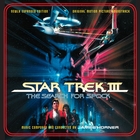Thanks to the efforts of small independent record companies like La La Land Records, Film Score Monthly, and Screen Archives Entertainment, the past year or so has been a bonanza for collectors of classic fantasy and science fiction movie scores. Recent releases that I once thought I’d never lay my eyes on (at least in legitimate versions) include John Carpenter and Alan Howarth’s pioneering synth-driven score for Big Trouble in Little China, Alex North’s aggressively atonal score for Dragonslayer, and James Horner’s score for Star Trek II: The Wrath of Khan (all of which appeared in complete versions). Film Score Monthly and Retrograde Records have now followed up their release of Star Trek II with a two-disc edition of Horner’s score for Star Trek III: The Search for Spock. This is my favorite of the TOS-era film scores (as much as I also like the work of Jerry Goldsmith, Leonard Rosenman, and Cliff Eidelman), and this reissue, which reproduces the score in its entirety, is an amazing piece of archival work.
James Horner’s score for Star Trek III reuses many of the themes he used in Star Trek II, but gentle, subtle tweaks to the orchestration invest them with a sense of sadness that fits the movie’s more subdued subject matter. The result is a score that has a wider, more comprehensive range of emotion, from the slightly toned-down reworking of Star Trek II’s main title music, to the Goldsmith-like, percussion-driven music associated with the Klingons, to the melancholic melodies that accompany Kirk and crew’s return to Vulcan.
The highlight of this score, and for my money, the best musical moment in all of the Star Trek movies, is the cue “Stealing the Enterprise.” Beginning with an extended quote from Prokofiev’s Romeo and Juliet, this nearly nine-minute cue begins with Kirk’s decision to abscond with the Enterprise from spacedock to take it to the Genesis Planet, and ends with his triumphant escape as the sabotaged Excelsior’s transwarp drive fails. The music is by turns playful, high-spirited, and intense, and sometimes comments with seeming sarcasm on the events on screen (note the comically bombastic arrangement as the Excelsior attempts to power up its transwarp drive). To see how much this music brings to this sequence, I suggest watching it with the sound turned down to see how deliberately paced it is—using nine minutes of screen time just to pilot a ship out of spacedock would be unthinkable in a modern SF film. Yet, here, in large part because of Horner’s music, it works. There are few moments in Star Trek films that are this tense, even on repeated viewings.
This FSM reissue of the Star Trek III score is a two-disc set that comes with a twenty-page booklet featuring extensive liner notes. The first disc reproduces the complete score as it appears in the film. Collectors who had the old GNP Crescendo version of this score will be happy to hear some moments that are missing from that earlier release—the delicate and eerie arrangement of the Vulcan theme as Kirk enters Spock’s cabin to find McCoy waiting there for him instead; the lilting, rhythmic violin line that announces sunset on the Genesis Planet; the triumphant fanfare that signals Kirk and company’s escape from the Genesis Planet’s destruction. (And remember the bit when McCoy tries to hustle a trip to the Genesis Planet from a shady alien in a bar? The light jazz that’s playing in the background during that scene is here, ten minutes’ worth. When you ask for a complete score, it’s what you get here.)
The second disc contains the material that originally appeared on the GNP Crescendo release—though some music thus appears on both discs, there are in some instances different takes of the same cues, and the liner notes document these takes meticulously. Though the first disc is interesting in its own right as a film score, the second disc’s sequencing and edits make it work better as a suite in my opinion, a single piece of music that you can listen to as such for its own sake. The second disc ends with a poppy, synthesized arrangement of the main theme that originally came as a dubious bonus with the U.S. vinyl release of this soundtrack. It is there in the interest of completeness, but you may find it better to pretend that it is not.
In short, this is a fantastic release. At $25 plus shipping it’s perhaps a little pricey, but this is a release for a niche audience that is the clear result of a labor of love, and so it’s well worth it. Here’s hoping that more classic reissues of this caliber are in store for us.
Dexter Palmer is the author of The Dream of Perpetual Motion, available from St. Martin’s Press.










